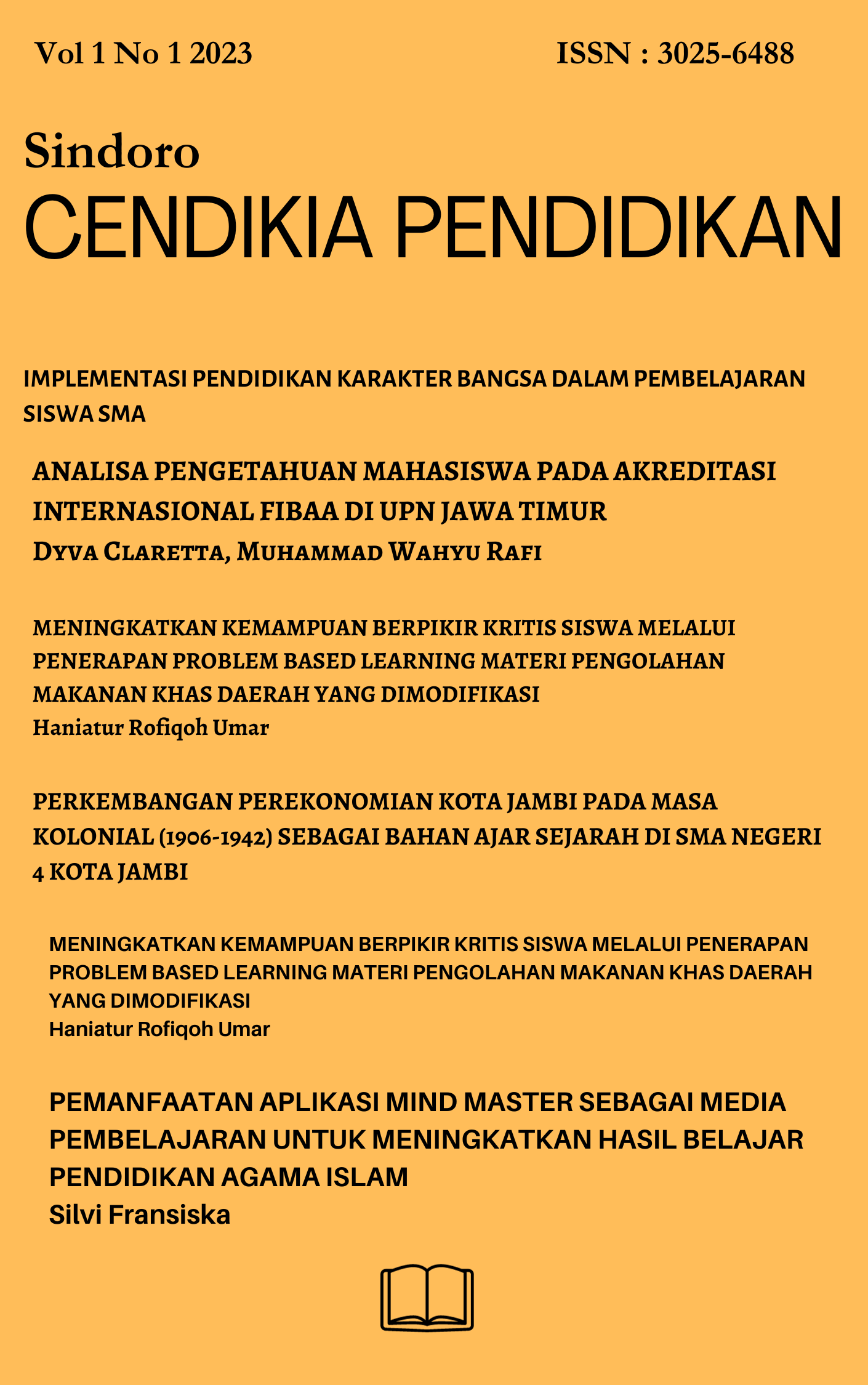MANAJEMEN PENDIDIKAN ADAPTIF DI ERA DIGITALISASI: TINJAUAN LITERATUR REVIEW
Main Article Content
Abstract
Artikel ini mengkaji konsep manajemen pendidikan adaptif di era digital melalui pendekatan literature review. Transformasi digital dalam pendidikan telah membawa tantangan dan peluang baru, sehingga institusi pendidikan dituntut untuk mengadopsi pendekatan manajerial yang fleksibel dan responsif. Studi ini memanfaatkan 20 jurnal (10 nasional dan 10 internasional) sebagai sumber utama, dengan fokus pada karakteristik, strategi, tantangan, serta implementasi manajemen pendidikan adaptif. Hasil kajian menunjukkan bahwa fleksibilitas organisasi, kepemimpinan transformasional, penggunaan teknologi informasi, pengambilan kebijakan berbasis data dan partisipasi stakeholder menjadi ciri utama manajemen adaptif. Namun, masih terdapat hambatan seperti kesenjangan akses digital, resistensi terhadap perubahan, dan keterbatasan kebijakan yang adaptif. Artikel ini merekomendasikan perlunya penguatan kapasitas SDM, infrastruktur digital, serta kolaborasi kebijakan untuk mendukung implementasi pendidikan yang adaptif dan berkelanjutan. Temuan ini memberikan landasan konseptual bagi penguatan kebijakan pendidikan yang lebih inklusif, berbasis bukti, dan relevan dengan tantangan era digital.
Kata kunci: manajemen pendidikan adaptif, digitalisasi pendidikan, strategi manajemen, kebijakan pendidikan.
Abstract
This article examines the concept of adaptive educational management in the digital era through a literature review approach. The digital transformation in education has created new challenges and opportunities, requiring educational institutions to adopt flexible and responsive managerial strategies. This study analyzes 20 journal articles (10 national and 10 international), focusing on the characteristics, strategies, challenges, and implementation of adaptive educational management. The findings reveal that organizational flexibility, transformational leadership, information technology utilization, data-driven decision-making, and stakeholder participation are core attributes of adaptive management. However, obstacles such as digital access inequality, resistance to change, and lack of adaptive policy structures remain prevalent. The article recommends strengthening human resource capacity, digital infrastructure, and policy collaboration to support the implementation of adaptive and sustainable education. These insights provide a conceptual foundation for strengthning inclusive and evidence-based educational policies in response to the challenges of the digital era.
Keywords: adaptive educational management, educational digitalization, management strategies, education policy.
Article Details
Section
This work is licensed under a Creative Commons Attribution-ShareAlike 4.0 International License.
How to Cite
References
Abidin, Z., Mathrani, A., Parsons, D., & Suriadi, S. (2016). Opportunities and challenges of mobile learning for promoting mathematical literacy. arXiv. https://doi.org/10.48550/arXiv.1606.02497
Aminatun, D., & Qodriani, L. U. (2022). Promoting digital literacy for teachers: Practices and challenges in Indonesia. Journal of Language Teaching and Research, 13(3), 504–510. https://doi.org/10.17507/jltr.1303.15
Astuti, Y. M., Dike, D., & Fatawi, I. (2024). Peningkatan literasi digital dan motivasi guru SD melalui media mandiri berbasis TPACK dan Canva. VOX EDUKASI: Jurnal Ilmiah Ilmu Pendidikan, 15(2), 281–291. https://doi.org/10.31932/ve.v15i2.3992
Chughtai, M. S., Syed, F., & Naseer, S. (2023). Role of adaptive leadership in learning organizations to boost organizational innovations with change self efficacy. Current Psychology, 43, 27262–27281. https://doi.org/10.1007/s12144-023-04669-z
Fitra, K. R., Aprilliya, S., & Lidinillah, D. A. M. (2022). Literasi digital ethic guru SD. Autentik: Jurnal Pengembangan Pendidikan Dasar, 6(2), 202–209. https://doi.org/10.36379/autentik.v6i2.213
Gomez Galan, J. (2018). Media Education as Theoretical and Practical Paradigm for Digital Literacy: An Interdisciplinary Analysis. arXiv. https://doi.org/10.48550/arXiv.1803.01677
Heifetz, R. A., Grashow, A., & Linsky, M. (2010). The practice of adaptive leadership: Tools and tactics for changing your organization and the world. Human Resource Development International, Harvard Business Press.
Heifetz, R. A., & Linsky, M. (2020). Applying the principles of adaptive leadership to person centred care. BMJ, PMC8077079. https://doi.org/10.1136/bmj.m8077
Hizam, S. M., Akter, H., Sentosa, I., & Ahmed, W. (2021). Digital competency of educators in the virtual learning environment: A structural equation modeling analysis. arXiv. https://doi.org/10.48550/arXiv.2105.08927
Intaniasari, & Dyah Utami. (2022). perspektif guru wilayah pedesaan. JUKANTI, 5(2). 151-161.
Landa, Z. R., Sunaryo, T., & Tampubolon, H. (2021). Pengaruh literasi digital guru dan manajemen pembelajaran terhadap minat belajar peserta didik di SMA Pelita Rantepao. Cendekia:Jurnal Ilmu Pendidikan, 5(1). 47-55. https://doi.org/10.31004/cendekia.v5i1.529
McAuley, I. (2020). Leadership, Not Leaders: Reflections on Ronald Heifetz’s Theory of Adaptive Leadership. Journal of Behavioural Economics and Social Systems, 2(1). https://doi.org/10.5278/ojs.bess.v2i1.6464
Naimah, N. F. M., & Meilina. (2024). Implementasi literasi digital pada siswa sekolah dasar. Jurnal Ilmiah Pendidikan Profesi Guru, 7(1), 85–94. https://doi.org/10.23887/jippg.v7i1.75992
Nurazizah, G. A., & Purwananti, Y. S. (2024). Kemampuan literasi digital guru dalam pembelajaran matematika sekolah dasar. JIP: Jurnal Ilmu Pendidikan.
OECD. (2020). Digital education outlook: Pushing the frontiers with AI, blockchain and robots. OECD Publishing. https://doi.org/10.1787/9789264888726
Safrizal, S., Yulnetri, Y., & Wulandari, N. (2023). Hubungan kemampuan literasi digital guru dengan learning loss pada siswa sekolah dasar di Nagari Lima Kaum. Jurnal Didaktika Pendidikan Dasar, 7(3), 829–842. https://doi.org/10.26811/didaktika.v7i3.1147
Schwab, K. (2016). The fourth industrial revolution. World Economic Forum.
Siemens, G. (2005). Connectivism: A learning theory for the digital age. International Journal of Instructional Technology and Distance Learning. http://www.itdl.org/Journal/Jan_05/article01.htm
Subaveerapandiyan, A., & Maurya, A. (2022). Digital Media and Information Literacy: A way to Paperless Society. arXiv. https://doi.org/10.48550/arXiv.2210.09349
Susanti, E., Indriyeni, I., & Astuti, Y. (2022). Analisis strategi peningkatan literasi digital pada pembelajaran Bahasa Indonesia. Jurnal Gema Pustakawan, 12(1), 15–25. https://doi.org/10.31258/jgp.12.1.15-25
Suprapto, H. A., Prabowo, H. A., & Suyana, N. (2024). Penguatan kompetensi literasi digital guru untuk meningkatkan kualitas pengajaran di sekolah. ABDIMAS: Jurnal Pengabdian Kepada Masyarakat, 1(3), 95–100.
Thygeson, M., Morrissey, L., & Ulstad, V. (2010). Adaptive leadership and the practice of medicine: A complexity-based approach to reframing the doctor–patient relationship. Journal of Evaluation in Clinical Practice, 16(5), 1009–1015. https://doi.org/10.1111/j.1365-2753.2010.01533.x
UNESCO. (2021). Reimagining our futures together: A new social contract for education. https://unesdoc.unesco.org/ark:/48223/pf0000379707
World Bank. (2022). Digital transformation of education systems: A review. https://doi.org/10.1596/37248
Wahyuni, D., Handayani, A., & Kurniawan, A. (2023). Analisis implementasi digitalisasi sekolah di daerah 3T. Jurnal Pendidikan Dasar Nusantara, 9(1), 23–31. https://doi.org/10.31258/jpdn.v9i1.3794

